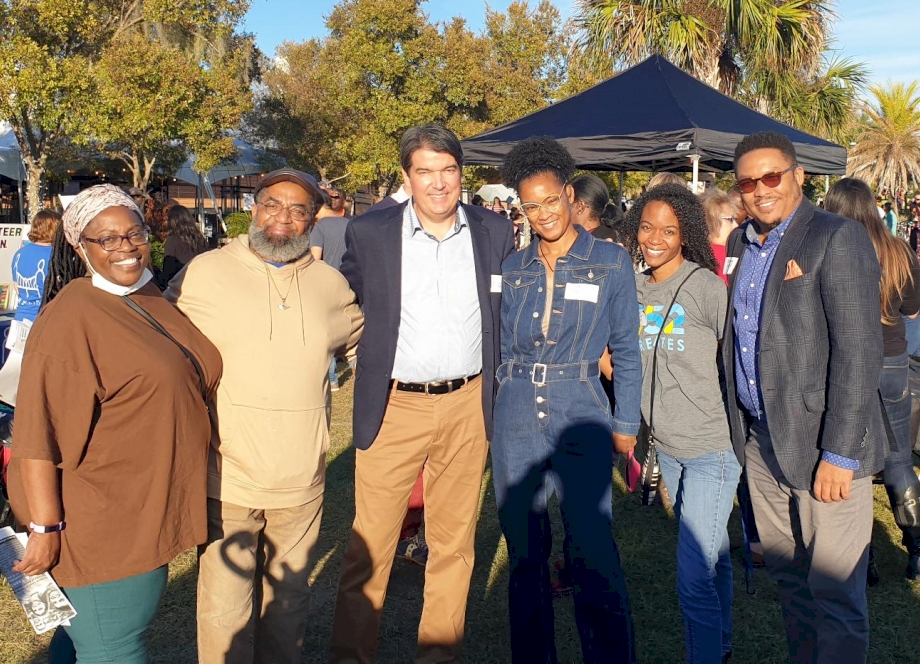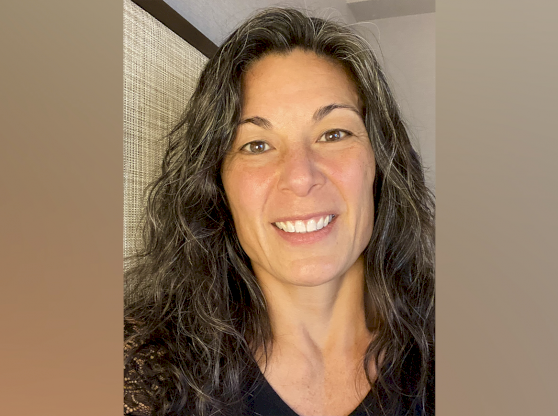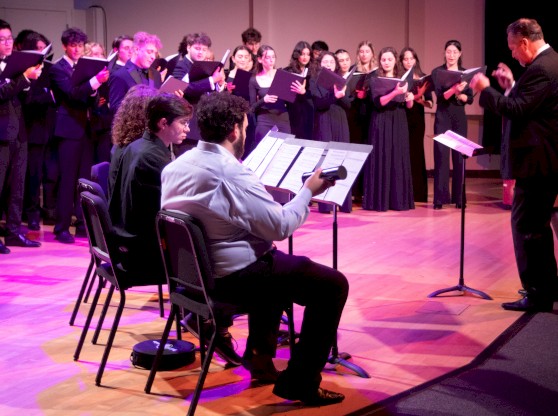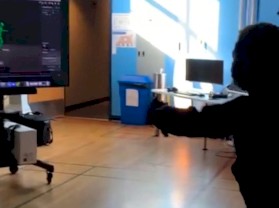Gainesville community members and University of Florida College of the Arts faculty in the UF Center for Arts, Migration, and Entrepreneurship and the UF Center for Arts in Medicine are collaborating on a three-year project that engages artmaking as a platform for reconciliation.
The Andrew W. Mellon Foundation awarded the University of Florida a $750,000 Humanities in Place grant to collaborate with Gainesville’s historically Black neighborhoods in researching their own questions and celebrating their stories through the arts.
Sparked by the work of Gainesville-native Terri Bailey and other local arts leaders, the Racial Equity in Community-Engaged Research project brings community members and College of the Arts faculty into partnership. The project will include a shared data collection and storytelling process, a summer apprenticeship for young adult artmakers, a conversation series and an installation of community art projects.
Bailey, who is a poet, spoken word artist and writer, founded the Bailey Learning and Arts Collective in town to build socially responsible communities and leaders through partnership, social entrepreneurship and artistic expression. Her organization has hosted art workshops, parades and guest speakers to advocate for health, capture stories and create change in the community.
Bailey is part of the research project’s community working group. She says this project ushers in a new chapter for community partnerships between Gainesville and UF, one that has been historically strained.
“Having us, as community artists and leaders, involved in this project ensures that there is a system of accountability,” Bailey says. “It adds to the validity of the researchers’ work and it helps us keep them accountable to do what they say they're going to do.”
Dionne Champion, research assistant professor at the UF Center for Arts in Medicine, will serve as the grant’s principal investigator. Champion is an engineer, dancer, arts educator and researcher who has led a number of community arts programs, especially for children who have experienced feelings of marginalization in STEM education settings.
Champion says the Racial Equity in Community-Engaged Research project is an opportunity to build a new equitable relationship and research exchange between the community and the university.
“Gainesville is bustling with innovative artists, creatives and culture bearers, many of whom come from multigenerational families in our historically Black communities,” Champion says. “As UF expands, it’s important to acknowledge and amplify the wisdom and aesthetics that are around us and precede us. We seek to flip the all-too-common dynamic of disinvestment and marginalization with a different approach to research that helps us be stewards in our local community.”
Champion will coordinate the grant alongside Alana Jackson, service learning lecturer at the Center for Arts in Medicine. Jackson is a songwriter, performer and spoken word artist dedicated to working in arts and health. She has facilitated arts engagement for patients and communities in and outside of Gainesville, including working with the Alachua Academy, a residential partner with the Florida Department of Juvenile Justice for girls at risk for substance use and abuse.
Bailey, Champion and Jackson will work in partnership with a community working group, which includes Gainesville arts leaders Jacob Larson, Carla Lewis-Miles, Turbado Marabou and Rhonda Wilson.
The team hopes to develop ways of co-creating and collaborating with the existing, successful work of Gainesville artists in order to uplift and facilitate growth in the community. If successful, the project could become a model for how artists, researchers and communities can work together, one that other cities and universities could use to replicate this kind of research.
"We are grateful for the Mellon Foundation's investment in the University of Florida to increase our capacity to become partners that collaborate with community in transformation through artmaking," says Dr. Joseph Glover, UF provost and senior vice president of academic affairs. "By engaging together, we realize an opportunity to deliver on our commitment as a land-grant university right here in our own city."
Beginning this year, the project’s first activity is to collect data through a process called countermapping. Community residents will serve as “artist-researchers” who will talk with other residents, collect stories and photograph and map spaces. They will then select photos that reflect the community’s needs and assets and create “countermaps,” artistic renderings that combine the stories and photos they captured. Participants will be selected through an application process and paid for their time and contributions.
“The countermapping project will be an opportunity for community residents to represent themselves and tell their own stories, and to identify critical areas of focus for their communities,” Jackson says.
This summer, the community and UF team will host a paid apprenticeship program for 20 young adult residents, ages 18 to 25. Over three weeks of half-day workshops, participants will work with professional artists, scholars and creatives who are engaged in artmaking in and outside of Gainesville.
“The goal of the apprenticeship is to facilitate the development of the next generation of emerging arts and social entrepreneurs in our communities,” Champion says, “and celebrate their expression of their stories, ideas and concerns about their community through a variety of art forms.”
Throughout 2022, the project team will host four “Critical Community Conversations” with community members, organizations, UF faculty and UF graduate students from diverse fields. Artist-researchers from the mapping projects will present their work to help guide the conversations, which are intended to inspire a series of art projects to be developed in 2023.
Next year, local artists and creatives will team up with community members and UF students and researchers to produce a physical or digital art installation that draws on and reflects the stories collected over the course of the mapping projects and conversations. Six project teams will receive funding.
In the final year of the grant, these projects will be installed in a Gainesville community cultural space.
The Racial Equity in Community-Engaged Research grant activities mark the first set of programming for the SPARC352 initiative, a Space for People, Arts, Research, and Creative Collaboration and Community—with 352 signifying Gainesville’s area code.
Champion and Jackson began working on SPARC352 two years ago, assembling the community working group and helping submit a proposal to the city of Gainesville to repurpose Old Fire Station No. 1 as an adaptive use empowerment hub. Answering the city’s invitation to negotiate, they proposed that SPARC352 could bring resources to the station that promote arts, wellness, cultural engagement, entrepreneurial ingenuity and community capacity building.
They have been working to build relationships between the city government and UF administration with the help of UF Office of Collaborative Initiatives Director Andrew Telles and UF Center for Arts, Migration, and Entrepreneurship Director Oṣubi Craig.
Craig says SPARC352 is a model for his center’s community-engaged and responsive work that can be shared and connected to other communities they work with around the world.
“We can take some of these best practices we plan to build in Gainesville and connect not only the ideas, but the people, with others who are working on similar issues around the world,” Craig says. “Where better for us to start that work than in our backyard? As the director of CAME and a returning son of Gainesville, I hope to share my expertise as a community organizer to connect the incredible expertise of our faculty with our local community experts, city and county officials and educational leaders.”
City leaders have vocalized support for the work of SPARC352, including city commissioner of district one, Desmon Duncan-Walker.
"SPARC352 administrators, artists and researchers have approached our community respectfully and in the spirit of shared co-creation,” Duncan-Walker says. “We know, as they do, that the arts can build community, economy and heal. We look forward to a continued strengthening spirit of mutual respect and towards building a resilient arts infrastructure by supporting and facilitating the growth of our community's arts and entrepreneurial practice.”
Discussions on repurposing the fire station are ongoing in the city, including determining estimates on renovation costs. But Jackson says that SPARC352 is more than just a physical space. The initiative represents an inclusive, arts-integrated approach to neighborhood development, growth and sustainable, positive change.
“We mean the first word, ‘space,’ to refer to the spaces in us, between us and in our communities,” Jackson says. “SPARC352 is about representing what it can truly look like for people to be whole people, for communities to be whole communities.”
Craig says the opportunity to co-locate resources in a facility would greatly expand SPARC352’s work but will not delay the programming and meaningful engagement SPARC352 will offer.
“We will continue to co-create with our neighbors and remain open to any space in the South Main Street area that the city and residents feel is best,” Craig says. “It is important that the facility is determined by the community and that it remains property of the city in order to maintain the integrity of SPARC352’s mission to develop self-sustaining community centers that the community has ownership of and the power to shape.”
SPARC352 is a partnership between community members, local artists and entrepreneurs, the UF College of the Arts, UF Center for Arts, Migration, and Entrepreneurship, UF Center for Arts in Medicine, UF Health Shands Arts in Medicine, UF Office of Collaborative Initiatives and the city of Gainesville. Learn more about SPARC352.



